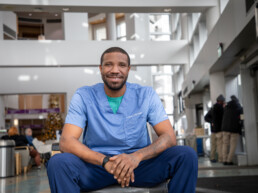With increased visibility on racial disparities in health care throughout the COVID-19 pandemic, combined with a national focus on the tragic deaths of George Floyd, Ahmaud Arbery, Breonna Taylor, and others, there has never been a greater need to stand up against racism and injustice. At UPMC, we firmly assert that these attitudes and actions of injustice have no place in our organization or in our country. These events provided a needed spotlight on how we must do better.
UPMC is committed to taking this moment to remind each of our employees of their responsibility and opportunity to be agents of positive change, the kind of change that can make a real difference. To quote G. Nicholas Beckwith III, Chairman of UPMC’s Board of Directors:
“Today, we renew our commitment to unite the communities we serve and create a more inclusive culture and respectful environment.”
As we keep this commitment at the forefront of our minds, we are reminded of a key idea: it starts with one.
Our UPMC story started with one: one hospital, in one neighborhood, in one city. More than 100 years later, everything from technology and innovation to geography and development has changed how we provide the best care for our communities. But despite all that’s changed since our earliest days, UPMC remains committed to a belief we’ve always held: that one idea, one moment, one person can be Life Changing. It starts with one.
It starts with one hospital team kneeling in solidarity with and for Black community, colleagues and staff.
It starts with one department equipping and educating our team members about the significant human inequalities that persist in our communities.
It starts with one coworker – like Tonya, a Senior Manager at UPMC Health Plan – making another feel welcome and accepted, affirming and celebrating the differences within our workforce and recognizing that they make us better.
Now, more than ever, you can be the one who helps us shape our communities and UPMC into a better place for everyone to work, study, play and thrive. Here are some suggestions on ways you can start to live out our values of Dignity & Respect in your workplace, in your community, and with your loved ones.
At Work
Respect the opinions of others
Stop and take the time to recognize someone’s input, idea, perspective, point of view, or contribution. This process involves active listening and asking questions!
Bring others into the conversation
Making sure someone was on the email, in the meeting, or otherwise aware of the decision that is being made, or the action that is being taken goes a long way. It doesn’t have to be complicated though; this can be as simple as inviting someone to join your lunch group!
Find opportunities to uplift others
Appreciation, affirmation, and encouragement are important things to extend to others, and play a big role in creating a better workplace environment for everyone.
Get more ideas with UPMC’s 30 Tips of Dignity and Respect
In Your Community
UPMC’s Center for Workplace Culture and Community Engagement partners with organizations throughout our communities that make it easy to share our values with others. Whether it be sharing your time with a local youth, mentoring those looking for a job, or connecting with those traveling to our area for the first time, there are countless ways to spread Dignity & Respect.
Here are few organizations the Center for Workplace Culture and Community Engagement partners with:
With Loved Ones
Take time to learn and listen! We need to value, respect, and support those who are most important to us – and sometimes this includes having difficult conversations. We always have an opportunity to grow personally and to challenge those who are closest to us to learn and develop. An important thing to keep in mind is that impactful interactions involve a combination of open-mindedness, careful listening, and encouragement.
* * *
UPMC may be 100,000-strong, but we believe that Life Changing Medicine is more than our collective mission: it starts with each of us recognizing our personal responsibility to be “leaders of dignity and respect, role models of compassion and caregivers for all.” This work starts with one — with us, with you: right here at UPMC.




